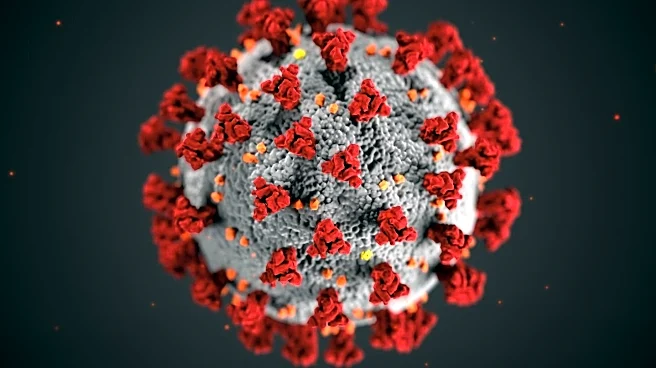What is the story about?
What's Happening?
A study published in JCI Insight has discovered the presence of human pegivirus (HPgV) in the brains of individuals with Parkinson's disease, suggesting a potential link between viral infection and immune function disruptions. The virus was found in brain tissue from Parkinson's patients but not in control samples, indicating it may influence immune signaling pathways differently based on genetic makeup. While the study does not establish HPgV as a cause of Parkinson's, it suggests that viral infections could interact with genetic risk factors to affect disease progression. Researchers used advanced sequencing techniques to identify the virus and observed its association with more advanced brain pathology, particularly in areas related to memory and emotion. The study highlights the need for further research into the role of viruses in neurodegenerative diseases.
Why It's Important?
The discovery of HPgV in Parkinson's patients could have significant implications for understanding the disease's progression and potential treatment strategies. If viral infections are found to influence Parkinson's disease, it could lead to new approaches in managing the condition, particularly for those with genetic predispositions. The study underscores the importance of examining environmental factors, such as infections, alongside genetic components in neurodegenerative diseases. This research could pave the way for developing antiviral therapies or preventive measures that target viral interactions in the brain, potentially altering the course of Parkinson's disease for affected individuals.
What's Next?
Future research will focus on confirming these findings in larger and more diverse patient groups, exploring the virus's interaction with genetic and environmental factors, and determining its specific effects on brain cells. Researchers aim to investigate whether antiviral treatments could influence disease processes, given HPgV's similarity to other viruses like Hepatitis C. The study opens new avenues for understanding how seemingly harmless viruses might impact neurodegenerative diseases, potentially leading to innovative treatment options for Parkinson's disease.
Beyond the Headlines
This study challenges the perception of HPgV as a harmless virus, suggesting it may play a role in shaping the immune environment in Parkinson's disease. The research highlights the complex interplay between genetics, infections, and neurodegeneration, emphasizing the need for a holistic approach to understanding and treating brain disorders. By exploring the intersection of infection and immunity, scientists hope to uncover new pathways for preventing or managing Parkinson's disease, potentially transforming the landscape of neurodegenerative disease research.















